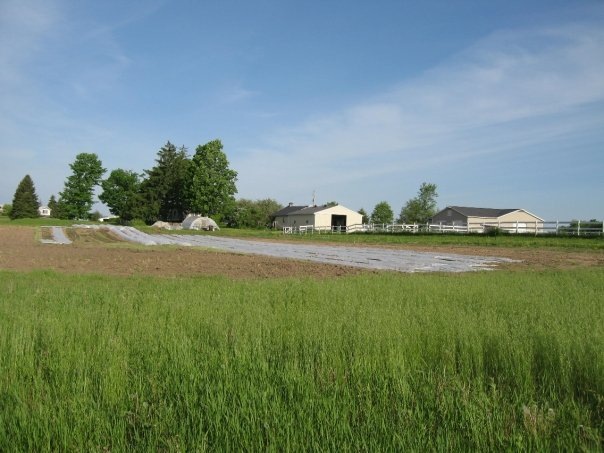
Why eat organic, local food? What is “Sustainable agriculture”?
Since this is a Rookie Tip after all, I'll keep it simple: when you are shopping for food and have two choices in front of you, always pick the one that is organic if you can afford it and when you can find it, and preferably local too!
(Note that you can get a free cheat sheet on how to afford real food, and which food to choose in every category, by joining my “Krew” here.)
What is Sustainable Agriculture?
- Read more here about sustainable agriculture, but the official definition is this: Sustainable agriculture is a way of raising food that is healthy for consumers and animals, does not harm the environment, is humane for workers, respects animals, provides a fair wage to the farmer, and supports and enhances rural communities.
Why eat Local?
- Anytime you're decreasing the steps between the farm and your table, you'll not only help out your local farms, but you're food will also have a higher nutritional value.
Why eat Organic?
- Buying organic means you'll eliminate pesticide/chemical exposure when it comes to produce (more on this below), and organic in other foods means things like no HFCS, no trans fat, no GMO's (more on this below too), and no chemical preservatives or artificial colors & additives. (However, an organic label only means it has to be 95% organic, so be sure to still read the ingredients! Read more about some of the junk out there that is labeled “organic” from Hallee the Homemaker.)
- When I say “organic” below, I also mean farmers who don't spray chemicals but maybe just can't afford the time and expense of the “organic” label. Best is if you know your farmer so you can trust his word on this.
 Foods rated most healthy to least healthy…
Foods rated most healthy to least healthy…
Note that I've recently updated this post and switched the order around between 2 & 3. I no longer will choose local over organic, because I want to avoid dangerous chemicals on our food, especially glyphosate, and I want to avoid genetically modified foods as well. Read more about glyphosate and GMOs below.
- No spray/organic and local – not always easy to find, so when you see it, snatch it up! Especially if it's from a farmer who you know and trust and who gets it about cultivating healthy soil that's full of nutrients!
- No spray/organic, but not local – sadly, here in Michigan this is mostly what we eat from the store all winter…but just remember that organic doesn't mean it's nutrient dense. Organic produce may not have been sprayed with dangerous chemicals, but that doesn't mean it was grown in rich, healthy soil. Also, there are many organic junk foods at the store — think boxed mac and cheese, which, by the way, I do buy for the kids now and then when Kent and I go out to dinner. At least they're not getting anything bad, but they're not getting especially nourished either — always add extra cheese though, and use real butter and healthy milk of course, and that helps! Read more from Kristen about Why organic isn't enough.
- Local, but not organic – this is what I can usually find the most of at our farmer's market in the summer. Surprisingly, there are still not as many organic growers as I'd like to see. Nowadays I ONLY go right to my organic farmers and skip the rest, depending on what I find here: Click here for which produce is OK to buy conventional and which is not.
- Not local OR organic – I used to say if you can't find organic or local, still eat the produce for the nutrients. Now I say to skip it and make something else! (Again though, it depends on this: Click here for which produce is OK to buy conventional and which is not.)
What's the Connection between Glyphosate and genetically modified crops/GMOs?
Over 80% of genetically modified (GM) crops grown worldwide are engineered to tolerate being sprayed with glyphosate herbicides,1 the best known being Roundup. The herbicide kills all plant life in the field apart from the crop. These crops are known as glyphosate-tolerant or “Roundup Ready” (RR) crops.
The idea behind such crops was to simplify weed control for farmers. The farmer could douse the entire field with glyphosate herbicide, killing all weeds without killing the crop.
But this is not the way things turned out. Weeds have quickly become resistant to glyphosate herbicide through a process called selection pressure, in which only those weeds that tolerate the herbicide survive to pass on their genes. The resulting epidemic of glyphosate-resistant “superweeds” has caused huge problems for farmers in countries where glyphosate-tolerant crops are widely planted.
As glyphosate becomes increasingly ineffective in weed control, farmers are turning to older, even more potentially toxic herbicides, like 2,4-D, an ingredient of the Vietnam War defoliant Agent Orange, and dicamba.5 6 7 8 9 10 11 12
People and animals that eat GM herbicide-tolerant food crops are eating high levels of residues of glyphosate and its main metabolite, AMPA.13 Both chemicals are toxic. (Find the full article including reference links here.)
And people wonder why I'm a freak about what I feed our family?!
More you might like:
- Find more Rookie Tips here.
- Another reason to eat organic: avoid irradiated foods
- Thinking about drinking fresh/raw milk? Read about clean farming practices to look for.
photo by Annia316



Kelly the Kitchen Kop says
Hi Beth,
You’ve raised a great question, and one that is often the subject for hot debates.
I guess I think of it like this: if I’m at Meijer and see some organic tomatoes from Mexico, then later find some not organic, but local tomatoes at the farm market, I’ll pick the local every time. Others may disagree with me, but when food is shipped that far, it just seems so unnatural, and it must be less nutritious, even if only from a freshness factor. (Although I’ll bet there are other factors involved, too, like taste, etc.) It always just feels so good buying local foods (especially if they ARE organic) that are in season – it feels like the way things are supposed to be.
There are, of course, many environmental and other good reasons to eat local. (A couple you mentioned: supporting local farmers, which is no small thing, and saving on the transportation costs to get the food here.) And believe me, I wouldn’t want to eat something local that was heavily sprayed, but I do know that many local farmers are more organic than not, they just can’t afford the time or money involved in getting the organic label. I always ask the farmers at the farm market, and often this is the case. (Sometimes you’ll just see a sign that says, “grown without chemicals” or something like that.)
Hope that helps! There are also some good articles on the topic if you google, “local vs. organic”.
I’d love to hear other’s thoughts on this!
Take care!
Kelly
Bamboo says
Hi Kelly,
You put local/not organic above organic/not local. Is there a reason besides supporting local farmers and gas, etc? Shouldn’t I choose organic whenever possible? I was at a little fruit/vegetable store the other day that I hadn’t been in before and they had some produce from the area, some not, and none of it was organic. I walked out and only got some overripe bananas that were on sale (oh, and a loaf of apple/cinnamon bread with no trans fats for a treat). I just couldn’t make myself buy the produce. Is my focus misplaced?
On the other hand… I discovered our Friday/Saturday farmer’s market in our town (well, only one trailer was set up, I don’t know if more will be there later in the summer) is local AND organic. What a treasure find! I believe them too because the radish leaves were all chewed up by bugs, lol. Between finding that a local raw milk source I feel like a child in a candy store! They can’t supply all that I need though, so I usually get organic at a grocery chain.
Thanks for helping me understand the heirarchy.
Beth
KitchenKop says
Hey Beth,
See my updated list above, I no longer choose local over organic!
Kelly